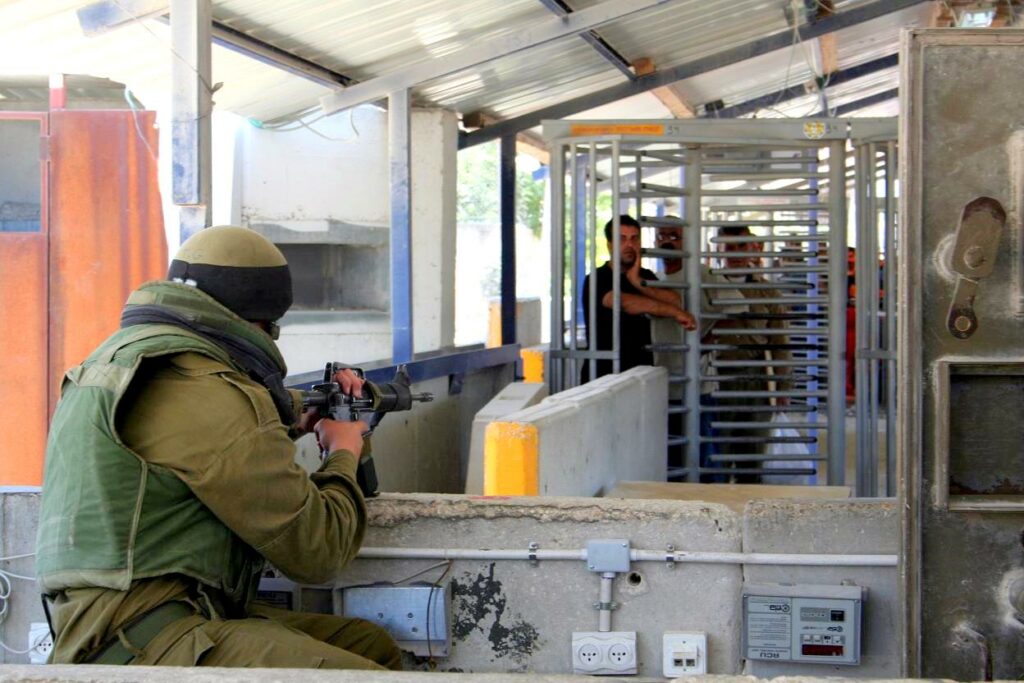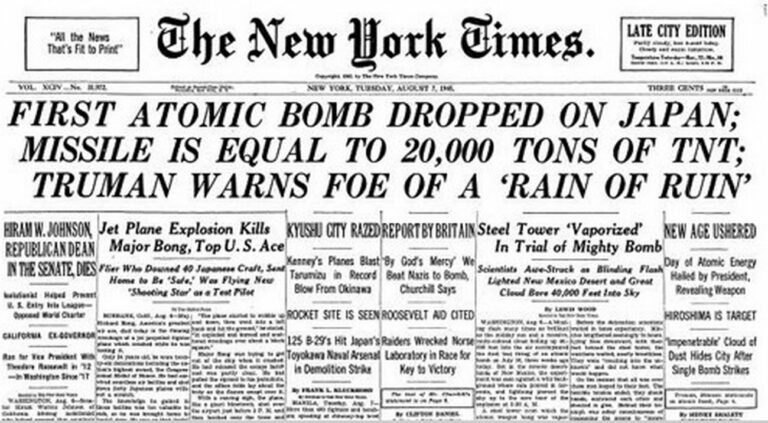This interview was originally published on July 11, 2014. Mr. Hever says Israel sells weapons and equipment of repression to countries with extreme inequality.
PAUL JAY, SENIOR EDITOR, TRNN: Welcome back to The Real News Network. I’m Paul Jay in Baltimore. This is Reality Asserts Itself with our guest in the studio, Shir Hever.
Thanks for joining us, Shir.
SHIR HEVER, ECONOMIST, ALTERNATIVE INFORMATION CENTER: Thanks for having me.
JAY: So, one more time, Shir is an economist. He’s researching for the Alternative Information Center, a Palestinian-Israeli organization. He’s also, I should have said in the earlier introductions–I haven’t yet said he’s working on his PhD right now, living in Germany. But his first book, it was–came out in 2010–was titled Political Economy of Israel’s Occupation: Repression beyond Exploitation.
And a lot of your work has been about the Israeli security state. I guess one of the things that doesn’t get talked about enough–at least maybe we do on the The Real News, but not much elsewhere–is how much money gets made out of the security needs of Israel or the perceived security needs of Israel. Talk about how important all that is to the Israeli economy, particularly the Israeli elite.
HEVER: There was a sort of wave shape in the amount of dependency of Israel on the security economy and the military economy. During the Cold War years, especially in the ’80s, there was a peak in massive investment in security and exports, and the Israeli industrial force was over 20 percent working for the military industry one way or another. Then that collapsed, especially during the ’90s. There’s a big shift to different sectors. Many of these big companies underwent a very severe crisis.
JAY: Why?
HEVER: Because the end of the Cold War meant lower demands. There was no investment in high-tech industry. There was also a deep social change in Israel with immigrants coming from the former Soviet Union which started to integrate into different sectors of the Israeli economy, mainly the high-tech sector, which was growing very fast. And so that meant that Israel was demilitarizing in many ways. And there was also this kind of hope that because of the Oslo negotiations there would be an end of the occupation. So international corporations started to invest in the Israeli economy in the belief or in the hope that it will become less militarized and the consumer economy would flourish.
All that was actually proven to be false, and starting from the year 2000, with the Second Intifada of Palestinians against the Israeli occupation, and even more after September 11, 2001, in the United States, there was a surge of the Israeli military industry again. And it’s not the majority of the Israeli economy. It’s not the biggest sector in Israel. But, nevertheless, there is no country in the world in which security plays such an important role as it is in Israel.
JAY: Now, before we get into the domestic situation, let’s talk about how important security is as an Israeli export, and also the politics, ’cause it’s interesting who they export to.
HEVER: Yeah, this is something that–Israel always played a very interesting role in the global arms trade, because there were some attempts by the Israeli military companies to compete with the U.S. military companies, which were crushed in the bud very quickly. And that shows exactly the moment in which U.S. support for Israel stops. Whenever an Israeli military company tries to sell something to China which has some U.S. technology in it or tries to compete with a U.S. company over producing a fighter plane, for example, that’s the end of U.S.-Israeli alliance right there.
So Israeli companies evolved into targeting themselves as a sort of complementary to the U.S. military industry. The U.S. is the biggest arms exporter in the world by far, but Israel is the highest per capita arms exporter in the world. And while the U.S. specializes in big combat platforms (fighter planes, bombers, warships, helicopters, and so on, tanks), Israel is selling a lot of components that go with these platforms. So if you already got the F-16 from the U.S., you can buy special missiles, navigation systems, communications systems from Israeli companies that go with your F-16.
JAY: And if you go back historically, sometimes Israel would sell and could sell things to regimes even the Americans couldn’t openly sell arms to.
HEVER: Yeah. Yeah. And whenever you make a sort of comparison of which are the biggest arms exporter in the world, Israel is not very high–well, it’s high compared to its size, but it’s never in the top five. But when you ask which countries are selling to developing economies or to those tertiary markets, then Israel is quite high on the list.
JAY: And it included the South African apartheid regime, Columbia, Honduras, and it goes on and on.
HEVER: Yeah. So if we’re talking about the ’60s, ’70s, ’80s, Israel sold weapons to Rhodesia, which also had an apartheid regime; to South Africa, breaking the embargo very blatantly; to Guatemala during the civil wars; to Chile under Pinochet. These were the–those countries which found it very difficult to convince the more mainstream weapon companies to sell them arms could always go to Israel.
JAY: And why–I mean, Israel’s always trying to present itself as a democratic country. They’re very interested in making sure that American–American Jews, particularly–support, send money to Israel. They never seem concerned. I mean, most American Jews are, you know, left-of-center, progressive in one way or the other, some of which except when it comes to Israel, but certainly when it came to South Africa and Chile and things like that. But they never seem to care about that, the Israeli governments.
HEVER: Well, sometimes it’s because they do that in coordination with the U.S. government. Like, for example, in the Iran-Iraq War, where there was weapons being sold to both sides of the same time, then Israel was selling to Iran and the U.S. selling to Iraq, and it was coordinated. So in that case they’re working with the U.S.
But also there was a sort of debate within Israel about how the arms industry is a strategic asset and who should they export to. And the question is: can the Israeli military grow stronger by this revenue that comes from exporting those kind of systems that are being developed for the Israeli army? Maybe those systems that are becoming a bit obsolete and outdated, we can sell them, use the money to develop something new.
And there was a worry in Israel after the occupation of 1967, because France, which was the biggest supplier of arms to Israel at the time, said they’re going to embargo weapons sales to Israel unless Israel withdraws from the occupied territory.
JAY: What year was that?
HEVER: Nineteen sixty-seven. And the Israeli government was worried there’s going to be an embargo. And at that point they said, we have to develop everything ourselves; we have to have a very strong military industry so that we can make our own tanks, our own cannons, and so on. They didn’t know that they were actually going to be rewarded for the occupation and that France, which sold some weapons to Israel, is going to be replaced by a much bigger supplier in 1973, six years after the occupation, the United States. So they already made that strategic decision: they’re going to reach out to new markets to try to sell Israeli weapon technology wherever they can.
But I think what we see in the last decade or so, especially after September 11, is that Israel has kind of shifted their target audience. It’s not that they’re looking for those countries that are under embargo to sell them the Israeli submachine guns. The famous submachine gun the uzi is no longer produced in Israel, actually. It’s now made in China. But actually they were going to sell to those areas in which there is extreme inequality, extreme social resentment, to the governments, in order to repress that kind of uprising.
So, actually, Israel is now the world capital of homeland security industries. They’re selling security cameras, surveillance equipments, drones, riot gear. That is the sort of technology that governments need in order to control their citizens. And it comes not just with the actual technology; it comes also with an ideology. It comes with the ideology that, look what Israel is doing, how Israel is controlling Palestinians and every aspect of their lives, and decides who can pass and who gets a permit and so on, and uses this technology to leave Palestinians no option to resist, and why don’t we sell that to other governments around the world. For example, Brazil bought a lot of that technology in order to repress the favelas in preparation for the World Cup. We see that in India, not just in the area of Kashmir, but mainly there along the border with Pakistan, and in East Europe. And we also see that with extreme-right governments, like Berlusconi in Italy that was worried about asylum-seekers coming from Africa, and using Israeli drones and Israeli technology to try to block that, but also not just buying the technology, but also buying the legitimacy, saying Israel is a wonderful country. Berlusconi was a big pro-Israeli spokesman. And if Israel is allowed to do it, we can do it too.
JAY: And part of what the Israeli model for their sales, I guess, says to these regimes is you don’t have to be worried about an uprising someday; you can repress people for decades and decades. Just look at us.
HEVER: Yeah. It’s a very cynical worldview. It brings to mind 1984, that you can just use brute force to repress resistance.
I think there is a limit to how much it can work. And there’s also a limit to understanding of how you can use it and where. Georgia–now that we’re watching what’s happening in the Ukraine, it brings to mind what happened in Georgia in 2008, in which a failed Israeli general, Gal Hirsch, who actually did terribly in the war against Lebanon of 2006, formed his own security company, went to Georgia, and talked to the government about selling them Israeli equipment. And the Georgian government believed, because of this prestige of the Israeli army, their equipment would be able to stop the Russian army. Now, we know what happened in the end in 2008. They were immediately defeated. So it actually goes to show that the Israeli army has completely lost its preparation and its technologies that were designed to fight other armies. The Israeli army hasn’t engaged in a conventional war for 40 years. They’re now completely concentrated on fighting civilians and repressing them.
JAY: And at the cutting edge. You mentioned drones and surveillance equipment. I saw, just as the day we’re doing this interview, Netanyahu was in California and made a deal with Jerry Brown to make deals with Silicon Valley, and cyber security is one of the things they want to work on. There’s a lot of integration or interpenetration between American capital and American security, intelligence, and Silicon Valley with Israel’s intellectual capacity, money, and security industry. And they have their political representatives, too.
HEVER: Yeah. But I think it’s falling apart, because the Israeli high-tech industry has grown, like I said, in the ’90s very rapidly. But it grew where many of these companies, their dream was to be bought by a U.S. company and then they can leave. A lot of the very talented Israeli high-tech entrepreneurs found themselves very happily moving to other countries. And then, between 2000 and 2008, there were eight years–so, after the crash of the NASDAQ of 2000 and until 2008, the next economic crisis, the average increase in value of Israeli high-tech companies was zero percent over eight years. During that time–that’s because a lot of those companies collapsed and lost everything. And those who survived were mainly tied to the security apparatus, and their biggest customer is the Israeli army.
JAY: Now, one thing you’ve been working on domestically is the privatization of security in Israel.
HEVER: Yeah.
JAY: What’s that story?
HEVER: That’s a big story, and because in the United States we see privatization of security has already progressed to a very high extreme. Israel actually was on the opposite extreme, because the army and the police were so integral to the way that the government control the population that the Israeli army was doing things like agriculture, paving roads, opening schools. So you can even maybe call that anti-privatization or socialism.
But they’re changing very fast. They’re moving very fast in the direction of the U.S., where they’re starting to outsource more and more of the function of the army and the police and privatizing the big weapons manufacturers. And they are doing that mainly because there is a shortage of person power. They don’t have enough soldiers for the checkpoints because many Israelis don’t want to go to the army, so they’re giving that to private security companies. But also because of the pressure of these companies, that they want to buy all of these very prestigious factories and security operations that are already known around the world for their ability to act against Palestinians, and then go and sell that to other countries around the world. So they’re putting pressure on the government: please sell that to us or please outsource this to us so that we can make some profit.
And Israel is in a kind of internal contradiction, because in the U.S., it’s a neoliberal, hypercapitalist economy where the government is not taking care of citizens’ social needs, and everyone’s for themselves, but if you want to go to the army, you’re going to get a salary. Israel has adopted the same kind of economic model of no welfare or very little welfare, as opposed to what it used to be until 1985, but at the same time, they didn’t offer also a salary for the soldiers. So this creates a kind of contradiction: why would a young Israeli go and serve the state for three years in the army when the state is doing nothing for him?
JAY: What? They don’t get–you must get paid when you’re in the army.
HEVER: No. You get enough money maybe to buy some cigarettes. And not only that, but the basic needs of the soldiers are not covered by the army. So that means on vacation they have to go back to their families’ homes. The family has to help with laundry, even buying extra socks and underwear, that sort of thing, which–soldiers don’t get all of their needs from the army. When a soldier says, my family cannot support me, they will not help me, then the army has no choice but to rent an apartment for them so they’ll have somewhere to be on vacation, to give them some extra laundry services, and so on. This is exactly what the army doesn’t want to do. The army’s–doesn’t want to spend money on these things.
JAY: So this gets outsourced, but when they’re outsourcing it, they’ve got to be spending more money than they would have if they had their own soldiers. But they’re having trouble recruiting.
HEVER: That is true, but many of these expenses are then rolled on to the public. And that’s why whenever you go to a restaurant or a supermarket, you’re not just paying for the products that you buy; you also pay something for security. It gets–.
JAY: Which is increasingly going into the pockets of the people that own the private companies.
HEVER: Exactly. Well, not increasingly. Only. You don’t pay for–.
JAY: No, I mean in the sense that more and more–as things get more privatized, it’s more than that.
HEVER: Yeah, the more these private security companies dominate every economic transaction.
JAY: So, how–if this is an increasingly big sector of the Israeli economy–I take your point it’s not the dominant sector, but an important sector–the interests of this sector certainly are not to have a peace agreement. How much does that influence politics?
HEVER: Well, it’s not easy to show how that influences directly. You don’t really see how that lobby works. But you can see that Israel’s former prime minister and former minister of defense, Ehud Barak, he has done many political mistakes in the last couple of years, and it seemed that he is not going to be able to get into the government again. So he said, I’m now going to do what I actually like to do best: I am going to the private sector. And then it becomes apparent that he has many friends who own these security companies, and he can open doors for them, and he can get a lot of money from them. So, obviously, these security companies’ business model is built on the occupation. These are companies that their motto when they go to arms trade shows and show their equipment, they say, this has already been tested by the Israeli army on actual people. You can only have that because of the occupation. So every new weapon is first sold to the Israeli army, shot at Palestinians. Then you can sell it.
JAY: Yeah, and they probably have nice little sales videos showing how this all works.
HEVER: Of course. Yeah. After this invasion of Gaza that we were talking about, there was a trade show that the Israeli army did where they showed how each and every of these new inventions were used in the attack on Gaza, completely shamelessly.
JAY: So the attacks become demos.
HEVER: The attacks become demos, and these companies make a profit out of it, and then these companies are hiring senior Israeli officials. I don’t think that means that they want to end the peace process or sabotage the peace process; it means they want to continue it forever, because as long as it continues, they can continue these periodic attacks and they can continue the occupation.
JAY: Yeah, ’cause the peace process is a process of never come to an agreement about peace.
HEVER: Exactly. Exactly.
JAY: Okay. We’re going to carry on our discussion, and we’re going to talk more about what might, what could a model look like that just might be possible someday–sooner, one hopes, than later–that would accommodate the aspirations of Jews, Arabs, and other people living in Palestine and in Israel.
Please join us for the next segment of our interview with Shir Hever on The Real News Network.
Podcast: Play in new window | Download | Embed
Subscribe Apple Podcasts | Spotify | Android | iHeartRadio | Blubrry | Email | TuneIn | Deezer | RSS
Never miss another story
Subscribe to theAnalysis.news – Newsletter
“Shir Hever is an economic researcher based at the Alternative Information Centre in Jerusalem. He is the author of The Privatisation of Israeli Security (Pluto, 2017) and The Political Economy of Israel’s Occupation (Pluto, 2010).”










